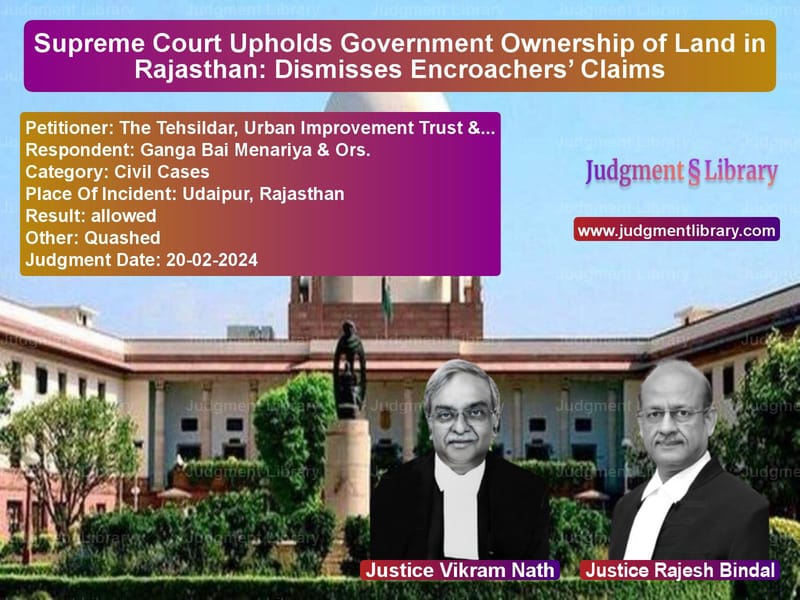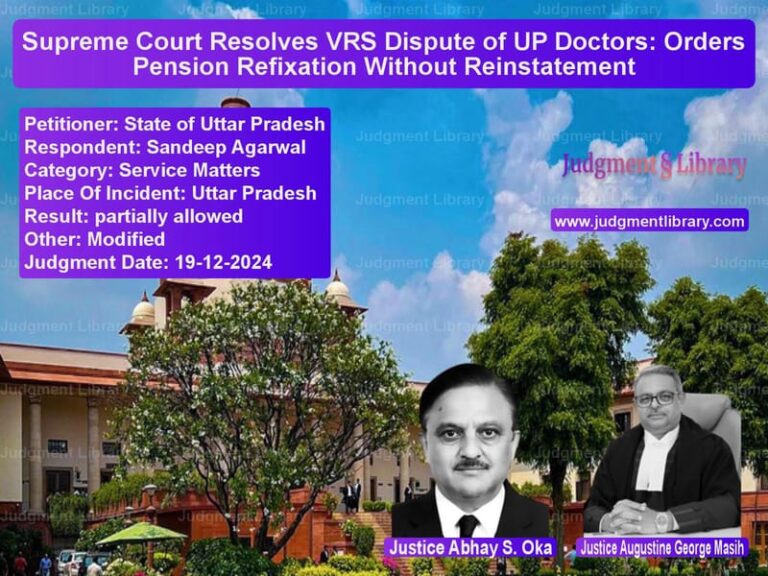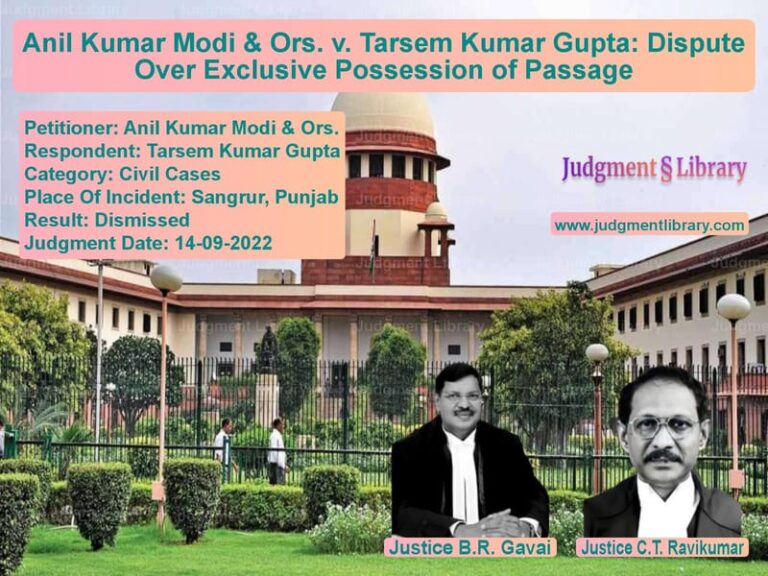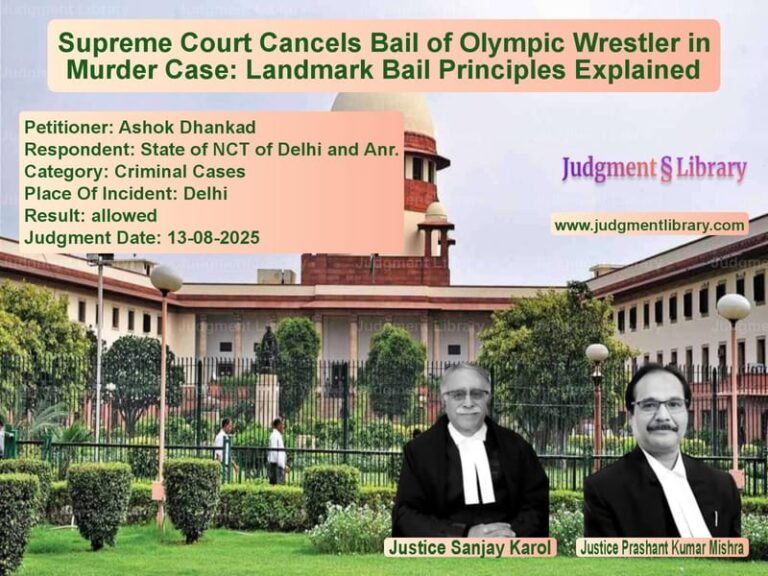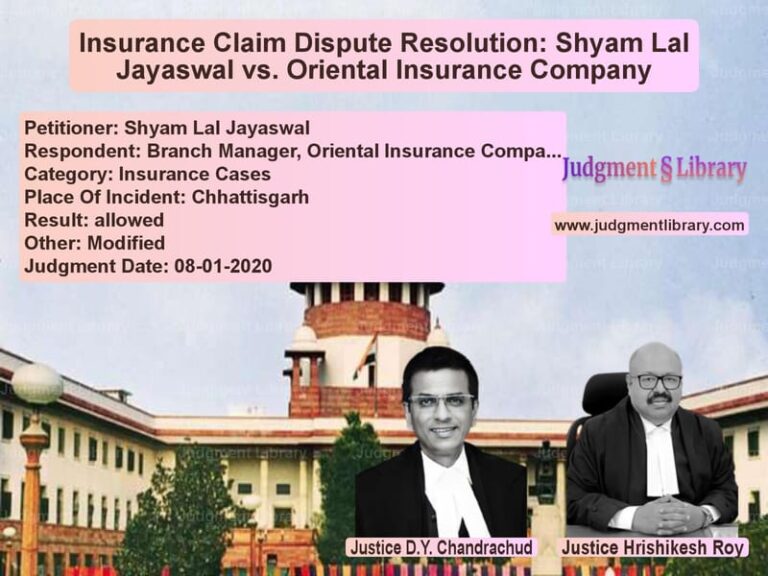Supreme Court Upholds Government Ownership of Land in Rajasthan: Dismisses Encroachers’ Claims
The Supreme Court, in The Tehsildar, Urban Improvement Trust & Anr. v. Ganga Bai Menariya & Ors., ruled in favor of the Government of Rajasthan, setting aside lower court orders that had favored private individuals claiming ownership of government land. The Court held that the land in question was reserved for grazing cattle (gochar land) and that the Gram Panchayat lacked authority to issue leases over it. The ruling reinforces the principle that government land cannot be privatized through illegal transactions.
Background of the Case
The dispute arose over a plot of land in Udaipur, Rajasthan, which the respondents claimed to have acquired through a lease (patta) from Gram Panchayat Titardi in 1959. The respondents filed a civil suit in 1999, seeking permanent injunction and ownership rights, alleging that the Urban Improvement Trust (UIT) was attempting to dispossess them. The land in question, measuring 1,330 square yards, was situated at Mauja Madri, Savina Road.
The appellants, representing the Rajasthan government and the Urban Improvement Trust, contested the claim, asserting that:
- The land was recorded as government land (Bilanam Sarkar) in revenue records.
- It was reserved for grazing cattle (gochar land).
- The Gram Panchayat had no legal authority to grant leases on government land.
Trial Court’s Findings
The Trial Court ruled in favor of the Urban Improvement Trust, holding that:
- The respondents had failed to prove legal ownership.
- The lease deed relied upon by the respondents was not legally valid.
- The suit, filed for permanent injunction without seeking a declaration of ownership, was not maintainable.
The suit was dismissed, affirming the government’s ownership over the land.
First Appellate Court’s Reversal
On appeal, the First Appellate Court reversed the decision, ruling in favor of the respondents. The court held that:
- The lease deed, though not registered in government records, was executed by the Gram Panchayat.
- The respondents had remained in possession for decades.
- The government had failed to challenge the lease deed within a reasonable period.
The First Appellate Court granted permanent injunction, preventing the government from interfering with the respondents’ possession.
High Court’s Affirmation
The Rajasthan High Court upheld the First Appellate Court’s ruling, holding that:
- The lease deed was valid since it was issued by a statutory body (Gram Panchayat).
- The respondents were in possession since 1959, entitling them to protection.
- The government had failed to prove that the land was exclusively reserved for grazing purposes.
The High Court found no substantial question of law and dismissed the state’s appeal.
Arguments Before the Supreme Court
Appellants’ (State’s) Arguments:
- The land was government-owned and could not have been leased by the Gram Panchayat.
- Revenue records consistently showed the land as reserved for grazing.
- The respondents failed to prove their legal title beyond the disputed lease deed.
- A suit for injunction was not maintainable without a declaration of ownership.
Respondents’ Arguments:
- The lease deed was executed by the Gram Panchayat, a competent authority.
- The respondents had remained in possession for over 40 years.
- The state’s attempt to dispossess them after decades was unlawful.
Supreme Court’s Observations
The Supreme Court, led by Justices Vikram Nath and Rajesh Bindal, critically analyzed the facts and made the following key observations:
- “The Gram Panchayat had no legal authority to lease government land, particularly land reserved for grazing.”
- “A lease executed without proper legal authority cannot confer ownership rights.”
- “Possession, even if long-standing, does not override government ownership unless backed by legal title.”
- “The respondents’ failure to include the Gram Panchayat as a party to the suit was a serious legal flaw.”
Key Legal Findings
- The lease deed relied upon by the respondents was invalid as the Gram Panchayat lacked authority to alienate government land.
- The respondents’ possession did not create ownership rights in their favor.
- A suit for permanent injunction without seeking a declaration of ownership was not maintainable.
- The High Court failed to consider crucial evidence, including revenue records proving government ownership.
Final Judgment
The Supreme Court allowed the appeal, ruling:
“The impugned judgments of the High Court and the First Appellate Court are set aside. The judgment of the Trial Court is restored. The respondents’ suit is dismissed.”
Key Takeaways from the Judgment
- Government land, particularly grazing land, cannot be leased or sold by Gram Panchayats without legal authority.
- Possession, even for decades, does not confer ownership unless backed by valid legal documents.
- A suit for injunction is not maintainable without seeking a declaration of ownership.
- Courts must scrutinize lease deeds carefully, especially in cases involving government land.
Impact of the Judgment
This ruling has wide implications for land disputes across India:
- Strengthens government control over reserved land, preventing unauthorized encroachments.
- Reaffirms the legal principle that ownership must be backed by proper legal authority.
- Provides clarity on the limitations of Gram Panchayat powers in land transactions.
- Sets a precedent for rejecting unauthorized land claims based on possession alone.
Conclusion
The Supreme Court’s decision in The Tehsildar, Urban Improvement Trust & Anr. v. Ganga Bai Menariya & Ors. reinforces the fundamental principle that government land cannot be privatized through unauthorized transactions. By restoring the Trial Court’s judgment, the Court has ensured that illegal encroachments on government property do not receive judicial validation. This ruling serves as a crucial precedent in land disputes where unauthorized possession is used to claim ownership.
Petitioner Name: The Tehsildar, Urban Improvement Trust & Anr..Respondent Name: Ganga Bai Menariya & Ors..Judgment By: Justice Vikram Nath, Justice Rajesh Bindal.Place Of Incident: Udaipur, Rajasthan.Judgment Date: 20-02-2024.
Don’t miss out on the full details! Download the complete judgment in PDF format below and gain valuable insights instantly!
Download Judgment: the-tehsildar,-urban-vs-ganga-bai-menariya-&-supreme-court-of-india-judgment-dated-20-02-2024.pdf
Directly Download Judgment: Directly download this Judgment
See all petitions in Property Disputes
See all petitions in Judgment by Vikram Nath
See all petitions in Judgment by Rajesh Bindal
See all petitions in allowed
See all petitions in Quashed
See all petitions in supreme court of India judgments February 2024
See all petitions in 2024 judgments
See all posts in Civil Cases Category
See all allowed petitions in Civil Cases Category
See all Dismissed petitions in Civil Cases Category
See all partially allowed petitions in Civil Cases Category

